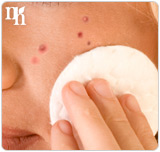
When a couple makes the decision to try to start a family, the woman may start focusing more on managing her health to prepare her body for pregnancy. It is unfortunate that for many women who would love to have children, their own bodies may be preventing what they want most. In the case of hormonal infertility, too much testosterone in the female body could be a threat to fertility and the ability to maintain a healthy pregnancy.
If you are having problems with infertility, read below to find out how testosterone may be preventing your pregnancy.
Testosterone and Menstruation
High levels of androgens - hormones associated with the male sex hormone - have been linked to menstrual irregularities. The menstrual cycle is the process that the body undergoes to prepare an egg for fertilization. At the end of each cycle, a woman either becomes pregnant or menstruates. Menstruation is the part of the cycle in which bleeding occurs and is necessary for reproductive health.
Testosterone and Ovulation
Mid cycle is the time when androgen levels are supposed to be at their highest, it's also the time of ovulation. During this phase, your body turns most of its testosterone, and much of its progesterone, into estrogen which is needed for the protection of the egg.
Testosterone and Polycystic Ovary Syndrome (PCOS)

Polycystic ovary syndrome or PCOS is a disorder characterized by hormonal imbalance, namely an overproduction of testosterone and other androgens which can lead to:
- Hirsutism or irregular hair growth
- Weight gain or trouble loosing weight
- Irregular periods
- Acne
If left untreated, PCOS can result in infertility. However, this is a very common syndrome among women and mild cases can often be treated with healthy diet and exercise.
Recommendation
Testosterone is generally considered the male sex hormone, but is necessary in small amounts in women to regulate sex drive and metabolism. If your testosterone levels are causing health problems, you should talk to your doctor about the possible causes for that.
If you suspect you are suffering from an androgen imbalance, ask your doctor to test your levels and discuss possible treatment methods. There are many prescription pills, creams, and shots available, but it is always best to start with the least invasive method of treatment first. Diet and exercise can have a profound effect on hormone levels. To find out more about testosterone hormones, follow the links below.
